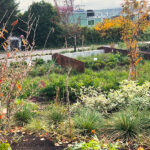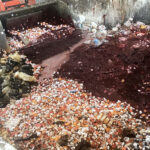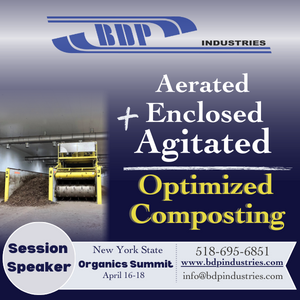Top: Hope Garden kit includes compost, seeds, bionutrients, a concentrate to make foliar spray, and a seedling.
Eric Mathis
In the wake of the COVID-19 pandemic, a new proactive response is emerging with compost playing a crucial role in co-building our collective immune system. In a study released in May 2020 entitled “The Power of the Plate: The Case for Regenerative Organic Agriculture in Improving Human Health,” written by the flagship of regenerative agriculture, the Rodale Institute, the authors took a deeper look into the “secondary effects of industrial agriculture on human health,” declaring that “the link between soil health and human health is largely unexplored and must be advanced.”
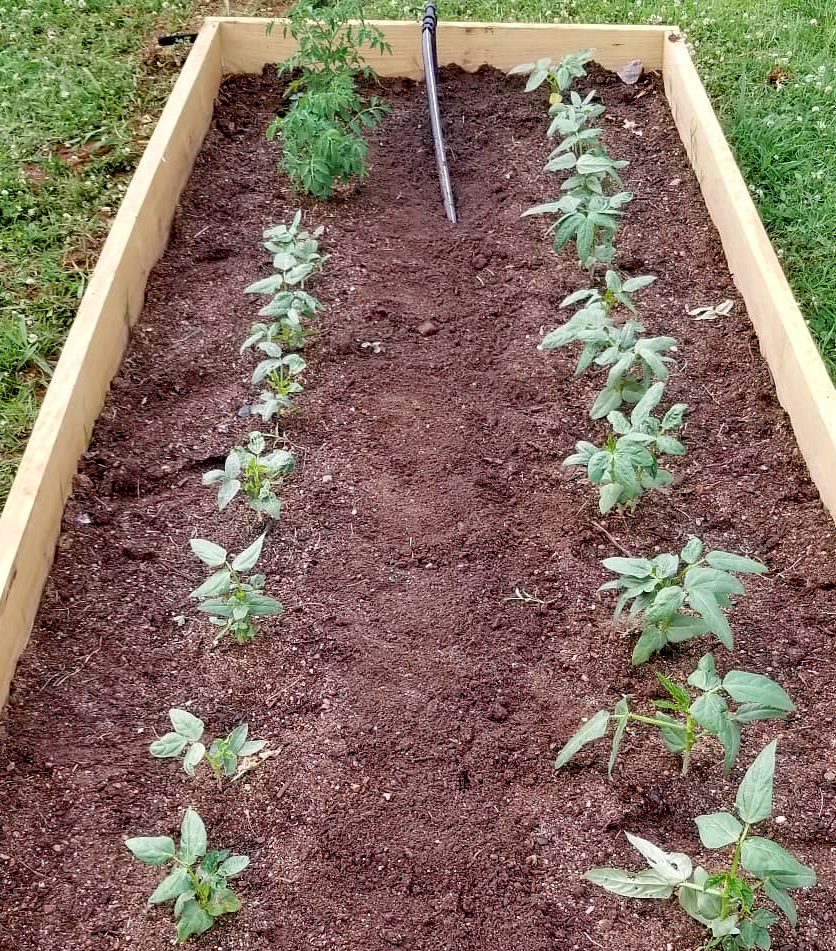
Volunteers worked together to build raised bed frames and install Hope Gardens at faith-based organizations, homes, urban farms and community gardens
Inspired by this study and also by an important linkage between Social Determinants of Health (SDoH) and Trauma Resiliency, a new model for co-building a post-degenerative economy is emerging in the heart of the Piedmont region in North Carolina. One of the Rodale study’s subsections entitled “the effects of industrial farming on soil” discusses the relationship between SDoH and healthy soil, stating that “some hypothesize that a decrease in the diversity of microorganisms in the soil driven by industrial farming methods could also contribute to loss of diversity in the human gut microbiome, decreasing immunity and contributing to chronic conditions.”
Over the past three years, key partners in Winston-Salem, North Carolina — including the Forsyth County School System, Wake Forest Baptist Health, Novant Health, Providence Culinary Training & Restaurant, Second Harvest Food Bank of North West North Carolina (SHFB) along with Jim & Betty Holmes Food Bank Garden, Love Out Loud Summer Camp, HOPE Winston Salem, Gallins Family Farm (regional composter), Every Tray Counts (NC’s school composting advocate), Bionutrient Food Association, Catalyst Kitchens, the Center for Trauma Resilient Communities and many others — joined together to support the development of Miracle Grounds Farm & Network.
Miracle Grounds Farm, located on the campus of Crossnore School & Children’s Home, functions as a city-wide resiliency platform that links a rich network of urban farms and gardens to a central anchor farm through an innovative composting initiative called the Story of the Plate. This initiative connects the dots for the emerging circular economy by building a citywide Culture of Health through a cyclical Soil-to-Food supply chain. Participating restaurants separate their food scraps, which are collected and composted by Gallins Family Farm, based in Davie County. The nutrient dense compost is delivered to Crossnore School for use its in gardens. Food grown in those gardens can be purchased by restaurants, completing the cycle.
Hope Garden Kits
Instead of focusing on the traditional “greening” or “environmental” framework for promoting composting, the Story of the Plate initiative uses a health-centric impact framework by telling the story of how composting is transforming the city of Winston-Salem by and through three inter-relational fields: Regenerative Entrepreneurship, Curriculum Design, and Health Innovation. The Health Innovation component includes an innovative Fresh Food Rx program and Renew Forsyth, launched during the initial COVID-19 shutdown in March 2020. Both initiatives synergistically serve as proactive responses to COVID-19. The Fresh Food Rx began with providing a pathway for community members to build deep relationships with individuals who are some of the most at-risk populations during the pandemic by distributing fresh food along with masks. Renew Forsyth built on these community relationships by integrating healthy connections with “Living Soil” (a term coined by the author) into this emerging resilient network through the distribution of Hope Garden kits, thus establishing the essential Soil-to-Food linkage that serves as a distinct characteristic of this Food Rx initiative.
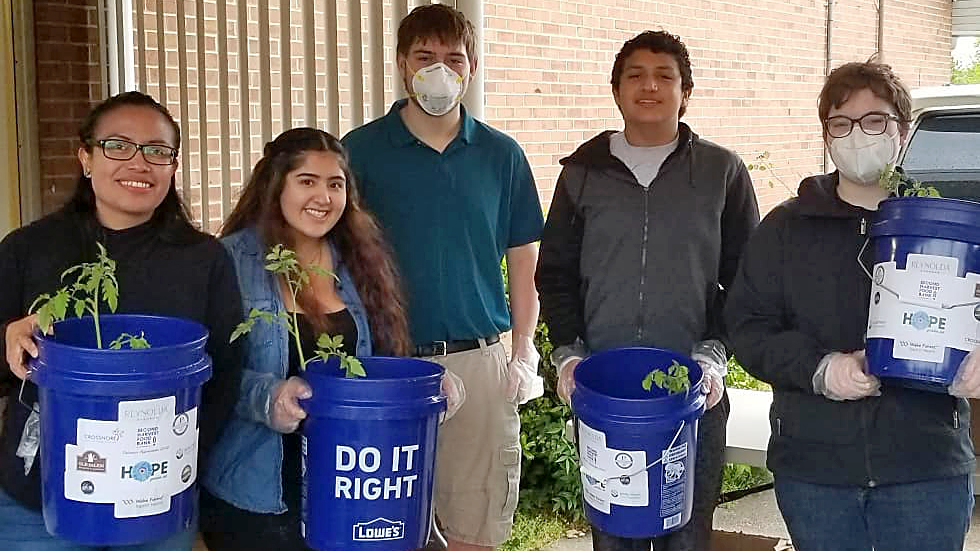
Hope Garden kits were assembled by volunteers and distributed with support from the Miracle Grounds Farm & Network. Photos courtesy of Eric Mathis
Utilizing humus as a catalyst for building a restorative, proactive response to the shutdown, residents across the city, from all faiths, ethnicities and backgrounds, worked together under approved social distancing measures to grow Hope Gardens at faith-based organizations, homes, urban farms and community gardens. As one voice, they have begun to grow nutrient dense food using regenerative agriculture methods prescribed by the Bionutrient Food Association. The strategy is simple: by reconnecting with the soil (that helps sustain a resilient immune system by building a healthy gut flora) and eating highly nutrient dense foods, we can begin to co-build a collective and moreover a proactive/preventative response to COVID-19 and future pandemics.
The garden kits include a 5-gallon bucket, compost from Gallins Family Farm, seeds, a blend of micronutrients, a concentrate to make a foliar spray, and a seedling. Renew Forsyth delivered Hope Garden kits with volunteer built garden beds specifically designed for older and disabled populations. As a part of this, they were paired with a growing body of caring volunteers who are committed to creating close/intentional friendships with community members by assisting where needed and specifically building Living-Soil in their new gardens. It is within this deeply relational network where hope is being discovered. Miracle Grounds Farm anchors the network, weighing in at a whopping 200,000,000 pounds of arable soil (2,000,000 pounds of soil per acre furrow slice x 100 acres) — arguably one of the largest urban farms in the United States.
Led by Wake Forest Baptist Health’s Mobile Health Clinic that went live in July 2019, the research component of this Soil-to-Food initiative has begun to collect data regarding the effects of patients consuming fresh vegetables as a part of the Fresh Food Rx program. More importantly and perhaps the most impactful regarding the potential long-term effects of this initiative (20+ years) will be the integration of this research with the Bionutrient Food Association’s Real Food Campaign Lab.
The Center for Trauma Resilient Communities and Miracle Grounds Farm & Network created a webinar series, the “Story of the Plate: Co-Building a Resilient Community,” which began during Catalyst Kitchens 2020 National Summit with a panel presentation entitled “Making Your Employment Partners Trauma-Informed.” This panel was directed towards the burdened restaurant sector in collaboration with Providence Restaurant, Catalyst Kitchen and Fair Kitchens. Webinar recordings as well as notification of new webinars can be accessed through this link.
Eric Mathis is cofounder of Miracle Grounds Farm & Network, director at the Institute for Regenerative Design and Innovation, and partner with the Center for Trauma Resilient Communities and a student at European Graduate School where he is finishing his PhD in Architecture & Urbanism under the direction of world-renowned visionary and leader in the emerging field of Living Architecture, Philip Beesley. Gary Bilbro, a Contributor to the article, works for EcoSafe Zero Waste, which provides programs and tools for waste generators to divert organics from their waste stream with a goal of producing contaminant free material for composters. This article took several excerpts out of J. Eric Mathis’ new book to be released on March 18, “Assembling Restoration: Living Architecture & Regenerative Design,” published by Riverside Architectural Press.



